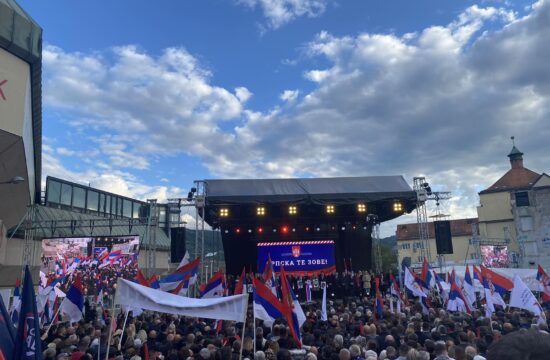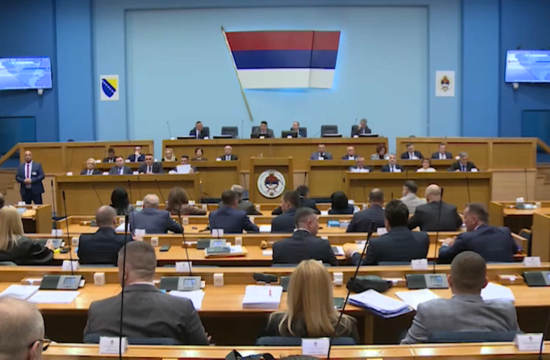
The border crossing with Croatia in the northwest of Bosnia has been closed on Wednesday after a group of migrants, who spent the night in the border crossing area, broke the first of two police cordons, the news agencies reported.
Some two hundred of migrants who stayed over the past months in an improvised tent camp near the northwestern Bosnian town of Velika Kladusa, only a few kilometres away from the border with Croatia, came to the Maljevac border crossing on Tuesday, insisting that the border is open so they could continue their journey to the European Union countries.
After spending the night in open, where they were surrounded by the police, the migrant started exerting pressure in the morning and eventually broke through the first cordon of the border police officers, which led to the closing of the border crossing.
Velika Kladuša: Migranti probili policijski kordon i stigli na most koji vodi ka Hrvatskoj https://t.co/KYtY7I14tN #migranti #BiH #VelikaKladuša #Hrvatska pic.twitter.com/MrU9IJ7RmG
— ANADOLU AGENCY (BHS) (@aa_balkans) October 24, 2018
Meanwhile, a group of the migrants who arrived Tuesday late evening in Bihac, about 50 kilometres away from Velika Kladusa, were stuck in the train as the police prevented them from leaving the coaches.
Namely, Bosnia and Herzegovina's Security Minister Dragan Mektic said on Tuesday that the police was instructed to stop the further arrival of migrants in the Una-Sana Canton (USC), where Velika Kladusa and Bihac are located. The order followed after the local population held a series of protests demanding from the state authorities to limit the movement of migrants and solve their accommodation issue.
This northwestern Bosnian region has become a hotspot for migrants who had entered the country through its eastern borders in the attempt to reach the European Union, their final destination. Although it is hard to assess the exact number of migrants in the Una-Sana Canton, due to their constant movement, the local institutions claim there are more than 10,000 of them in this region.
USC Police Commissioner, Mujo Koricic, told a press conference on Wednesday that a further influx of migrants in the region would mean a further threat to security.
“It is the fact that the migrants are on daily basis committing numerous criminal offences, burglaries, raping, robberies. We won't give up on these measures,” Koricic said.
Over the past months the police intervened on several occasions acting upon the reports of the clashes, burglaries, robberies, rape claims, all of them involving migrants currently situated in Velika Kladusa and Bihac area. The identified felons among the migrants were subjected to criminal charges and were sent to a migrant centre near Sarajevo to be under the police control.

Samir Alagic, the Bihac railway station manager, sent out a dramatic call for help on Wednesday, saying the situation was not good at all.
“The people in four coaches of the train have been here since 12:30 a.m, They were protesting the last night when they arrived here, there were situations when the use of force was necessary. The police officers are fair, they listen to the orders of their superiors. The situation is such that we had addressed the Security Ministry, the Interior Ministry, to help us stop the arrival of migrants and disable the sale of tickets, and we always received the answer they were not in charge,” said Alagic, who said he never received a written order to stop the migrants and send them back to Sarajevo.
What Alagic received was a phone call “of a police officer from Bosanska Krupa, where a meeting was held and where some conclusions were reached, including the one that the entry of migrants in the USC would be barred.”
According to N1's reporter, the buses that would transport the migrants back to Sarajevo are arriving at the railway station. Where are they going to be accommodated upon arrival in the capital is still unknown.
The migrants who used bus transportation to reach Bihac, said the police commissioner Koricic, were stopped in the town of Kljuc, about 100 kilometres away from Bihac, and sent back to Sarajevo.
“The law on internal affairs is clear. The police commissioner is the one in charge of the state of security,” he underlined.




